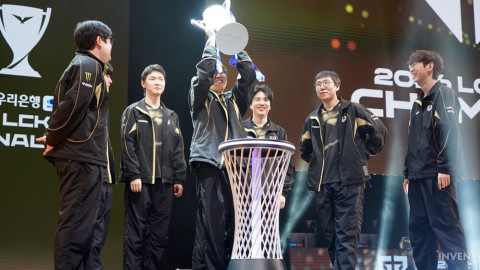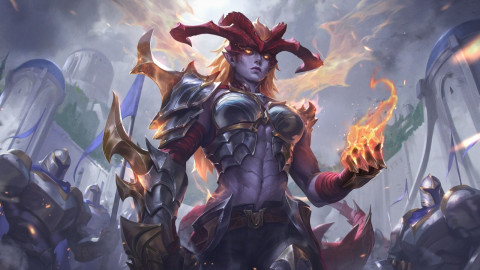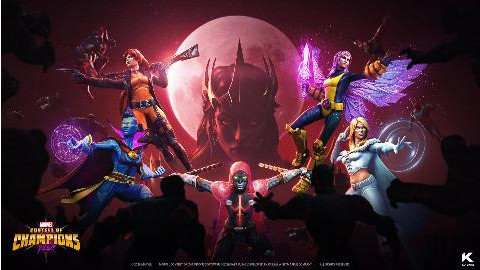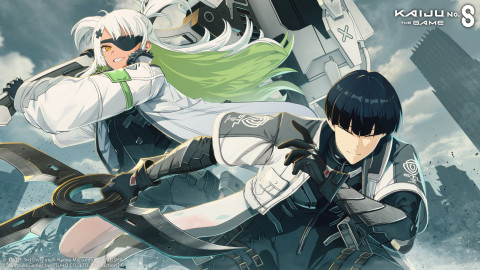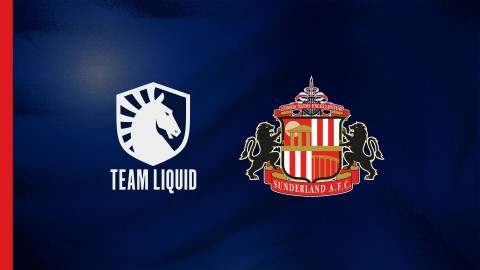
Sam "Kobe" Hartman-Kenzler has once again casted the finals of the World Championship this year. As one of the scene’s most tenured commentators, even in the offseason he follows the happenings of the scene intently. Inven Global had the chance to talk with Kobe, and discuss his thoughts on NA, his perspective on casting, and why he loves Super Smash Bros. Melee.
You recently casted the finals of Worlds 2021 between EDward Gaming and DWG KIA. Given it was the first best-of-5 ever at Worlds finals, had the highest viewership ever, and had China winning again, how do you think this Worlds finals will be looked back on in esports history?
Well, we've only gotten the full five games I believe one other time. And so it's always looked upon as such a rarity. And I think this will serve as a very recent reminder and give people hope. Oftentimes, when you get to finals people write it off. They think the most exciting parts of the tournament are usually much earlier on because the finals often end up being stomps. But in this case, not only did it go to full five games, but also leading up to it, we had the narrative of LPL as a region being disappointing and FPX getting eliminated so quickly. It led to this swell of LCK favoritism, with everybody predicting them to win. And I think that it will hedge that a little bit, as far as people who would step out and predict the "underdogs" would get their heads chopped off.
I think this gives more credence and maybe it will make people more balanced when approaching these things. Because, there's a lot that is left to be tested, and a lot that is left to be proven in some of these cases. So I think that it'll serve as a reminder to look back and be balanced and open to other perspectives.
Technically speaking, what was it like doing a tricast with Vedius and Atlus? Some casters are intimidated by the format. As the most experienced caster there, did you feel you had to take the lead?
The mechanics of a tricast always depend on each individual caster. So there's no universal, "Okay, I'm gonna have to take the lead more on this one." Maybe someone is more nervous or hasn't done but you always discussed beforehand what people are most comfortable with. And some people excel in different areas. And so you just want to adapt to those people. I think that is something I've always been good at and recognizing — what certain people need or what certain people want to have as their strengths or excel at.
I have done a lot of them. As far as like the intimidation factor, I think it is the best way to cast. I think it is just so fun, and can add so much texture and complexity and variety to it. So I'm always super excited when we get to do international events and get to do tricasts. And that's why I was really disappointed for a lot of COVID restrictions. Sometimes we'd have remote stuff or restrictions and we didn't get to do as many. I absolutely love working with all of the different international casters and all of my co-workers from all the different regions. It's one of the things I look forward to the most. That and casting in-person in stadiums with the crowd noise. That is the peak of my job. That is literally the peak — casting at a stadium with a tricast for great games like that.
What is your opinion of the direction NA teams have gone now with their recent performance and the Champions Queue server? Do you think there’s a strong enough direction now where NA can start making some noise?
But I have often felt as well, in the past, there have been a lot of times when North America is in a position to do more damage than they actually ended up doing at Worlds and win more games. And I definitely think that we are, we're in a pretty good position going into this year as well with the offseason. Looking back, since I've done this, since the very beginning of the game, we have definitely progressed. 2018 was the breaking point. That was the watershed moment that really gave life to the true North American hope — when Cloud9 broke through and got to semifinals. And that was kind of the downfall of the Korean dominance that had just been this blanket basically, over international events for so long.
Obviously LPL has risen as well and taking several World Championships themselves. But I do think we are in a good position. And the the organizations are constantly trying to push to that peak. Because there's such a reward for underdogs that finally have a true big success, that I'm really happy with all the efforts that have been made. We're trying to build up North American talent. We're trying to incorporate imports well, by focusing on culture as well as communication and trying to find actual good fits that are gonna stay like CoreJJ. So I think I think there are a lot of positive things pointing towards the future.

You were someone that complained about Jensen potentially not having a spot for 2022. What is your perspective on the ever-increasing salaries?
Yeah, I definitely think the salaries have gotten to outpace the financial backing that you can actually find returns for. And so we always kind of knew at some point, there's going to be at least some level of rubber band effect. And there's been this very clear separation of the organizations that can and are willing to spend a lot of money, and those those that are not. And so there's this kind of line now that's been drawn, it feels like this offseason, and we're starting to get some of the effects of big buyouts being held on to. The language on some of these contracts in various cases has been kind of restrictive. So we're seeing several high-profile, strong individual players for multiple reasons that are not willing to play for a team that they think is just bad. Because I think it will tarnish their reputation, and they think that it won't be worth it. And so there are a lot of factors in the offseason, that head into some of these crazy situations where we actually find some of our best players teamless.
How do you see this being resolved?
It depends. You kind of see it in steps, where a bunch of teams are making stands not willing to pay some of these prices were some still are. If there continues to be big injections of money, then it can get right back to that level, or it can even keep on going. It's very hard to project on these things, especially with the global pandemic throwing more wrenches into the economy and how it's going to affect sponsors in that sort of influence I know. There's, there's just been so many so many ups and downs. So that one is definitely hard to hard to predict. But we are seeing the difference.
I'm not quite sure. I do think that especially after last year was some of the biggest price tags that we've seen on imports ever in North America. They're taking it more into consideration. The team owners are becoming a bit more precise on how they want to go about some of these things, I think. And that's why we're seeing them hold on to large buyouts for longer periods of time because they feel like since they've actually paid that much for players, that that is market value. But if the demand is not meeting the supply there, then we're gonna have excess supply of extremely large buyout strong players.
There have been concerns about the popularity of League in NA over the past few years — do you think we’re going to start seeing a lot more interest now?
I think we are probably going to see a bounce back from last year. There are a lot of excitement as far as factors heading into this year for North America. Yes, we had some good international performances. We have had good international performances before, it's just that they have been spread out, and oftentimes right after we have them we lose to Europe which quickly puts a stop to the cheering. Team Liquid makes MSI finals and then gets 3-0'd by Europe, or Cloud9 makes semifinals at Worlds and then Europe wins again.
And I think the format changes are actually positive for viewership. I think they were looking at areas of viewer fatigue with the multiple days. We've tried different variations of three day broadcasts and broadcasting on weekdays like either Friday or Monday and haven't really found something that sticks there. So maybe reducing down on viewer fatigue will help. We also always have so many good stories and drama in North America. And with this offseason, we even got more of that with some of the older players returning. Bjergsen returning, Doublelift getting into a bunch of drama with TSM — all those types of things bring more more viewers and more people in.
Looking at the past few years, what would you like to see more of in the LCS—that can be in terms of the broadcast, anything to make a more enjoyable show.
I think the biggest success of the LCS and North American League of Legends has always come from very deep fan connections to individual players and stars. If you think back to the heydays of Sneaky and Doublelift and players like this that spent a lot of time streaming and building connections with fans on an individual level and on a personality level, and really getting to know them. I think that bringing that back to the spotlight, the the very intense fan connections to individual players and personalities. And even if we're able to expand that to teams as a whole and some of the bonding experience that goes into being such a close knit hardcore group of gamers that goes along with being competitive team. I think that that's probably some of the goal to aim for, that has in our history led to so much of our success of fandom in North American League of Legends. It's always really come down to people really relating to, and having these connections with the players.

Recently you made a shoutout to Mango, I wasn’t aware you had an interest in Melee. What’s your relationship with Super Smash Bros. Melee as an esport?
Like many, I started as a very early Smash Melee player who thought that I was really good by beating my friends and my neighbors and my brother. And being the best in like a close knit group. And then when I went off to college and played more people from around and went to my first tournament, I quickly got destroyed, and brought back down to reality. But it's always been a game where, since I spent so much time growing up playing, I've always to some degree and to some level kept up with at least the more high profile matches that I've always gone on. So I always get super excited. I never played too much of traditional fighting games, but played a whole bunch of Melee. So it's always been something that I've just really enjoyed.
What do you think makes the game unique to watch?
One thing I think, melee does really well and kind of separates it from traditional fighting games is that it is it is very easy to get in on a base level and be inclusive and have that, kind of just group of friends having fun feel. But it also has a very high skill cap. And that's something that sometimes is exclusive with games, where they'll have a really high skill cap, but then it that kind of puts up a barrier to entry for newer players. So I think it does that really well where it encapsulate, it can bring large audiences and large groups of people together as literally a party game. I think is probably one of the most played at parties in the background, but as well being extremely competitive and have a very high peak as far as the possible skill discrepancies that can show up. So I think that's one thing that it did really well.
If given the opportunity to cast it, would you?
I definitely would, I would have to study up for sure. But I think that would be super exciting. Somebody also asked me here today like, "Oh, what if you know you could cast a basketball game", and that's another thing where I grew up playing basketball. I'm like hell yes. I would definitely take a lot of grinding and work to get ready, but I would love it.
-

I write. I rap. I run. That’s pretty much it.
Sort by:
Comments :0


